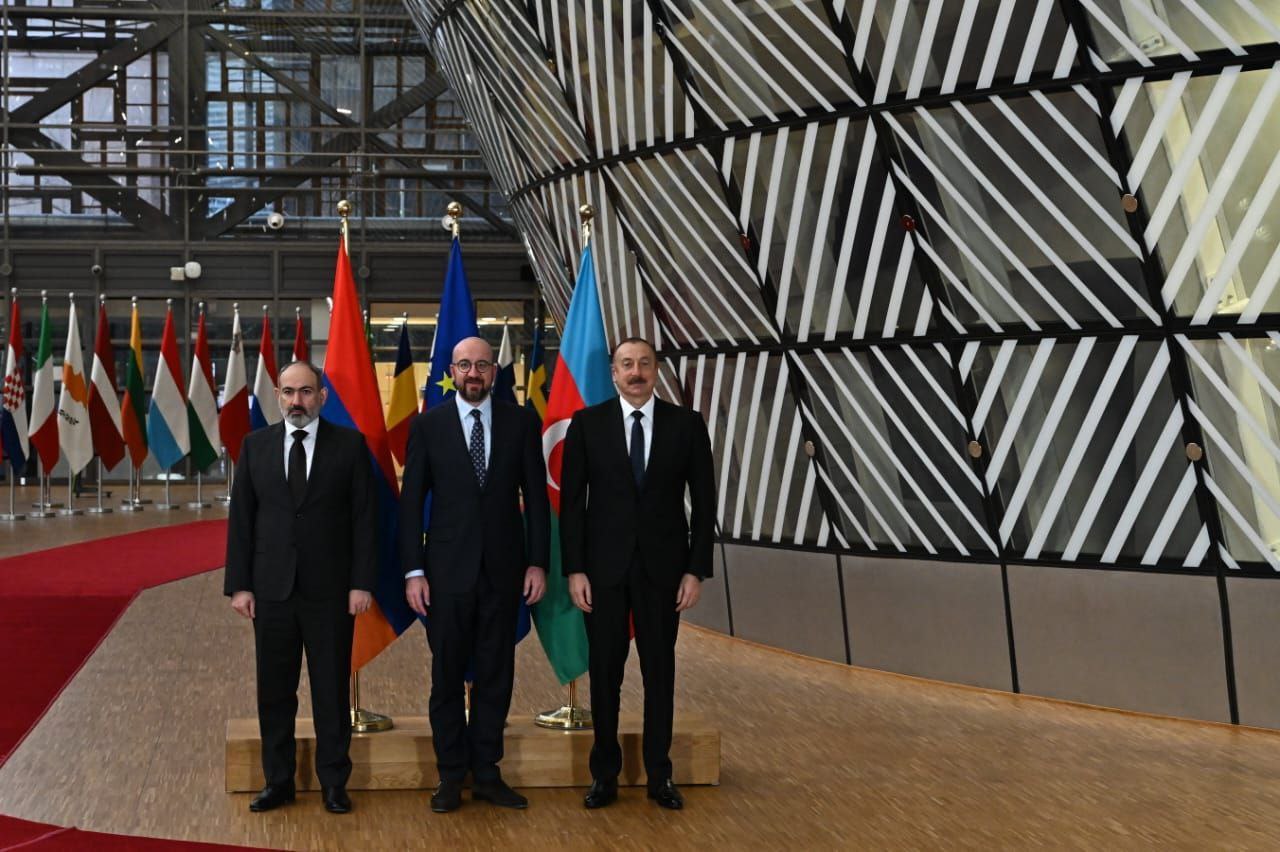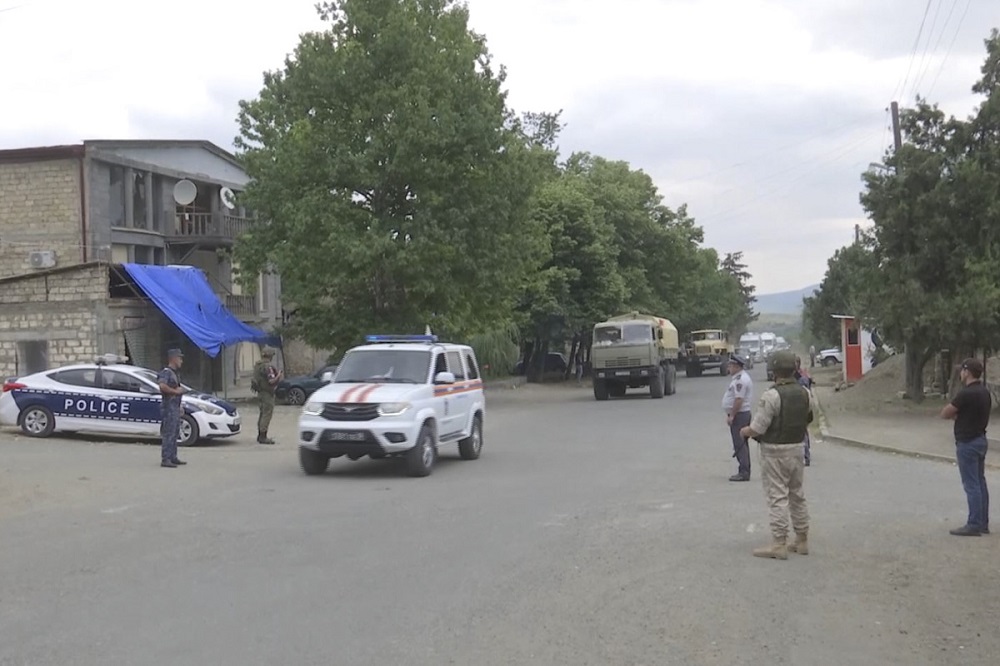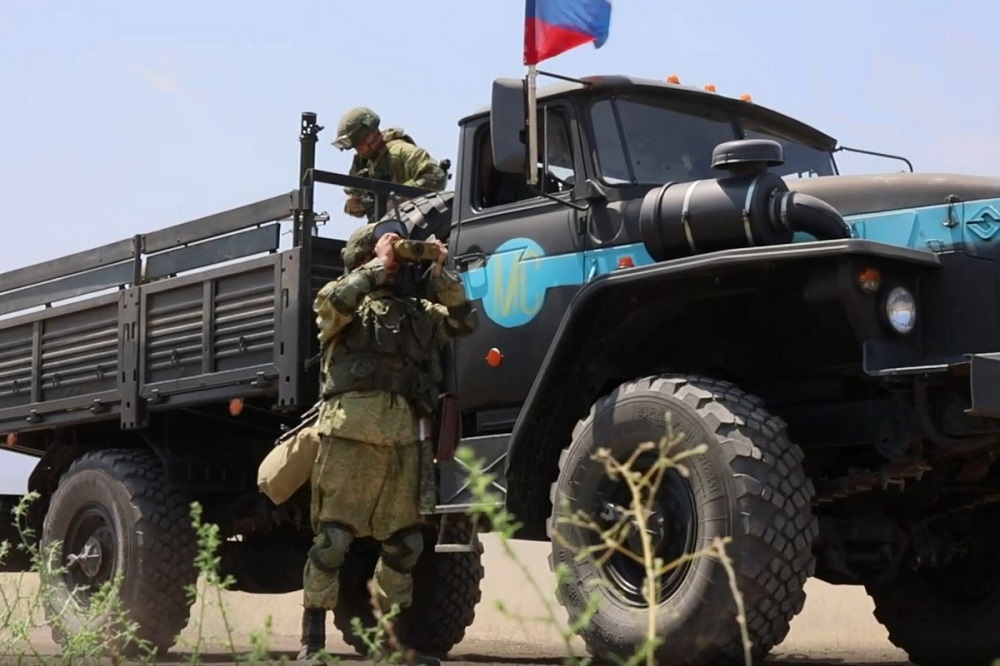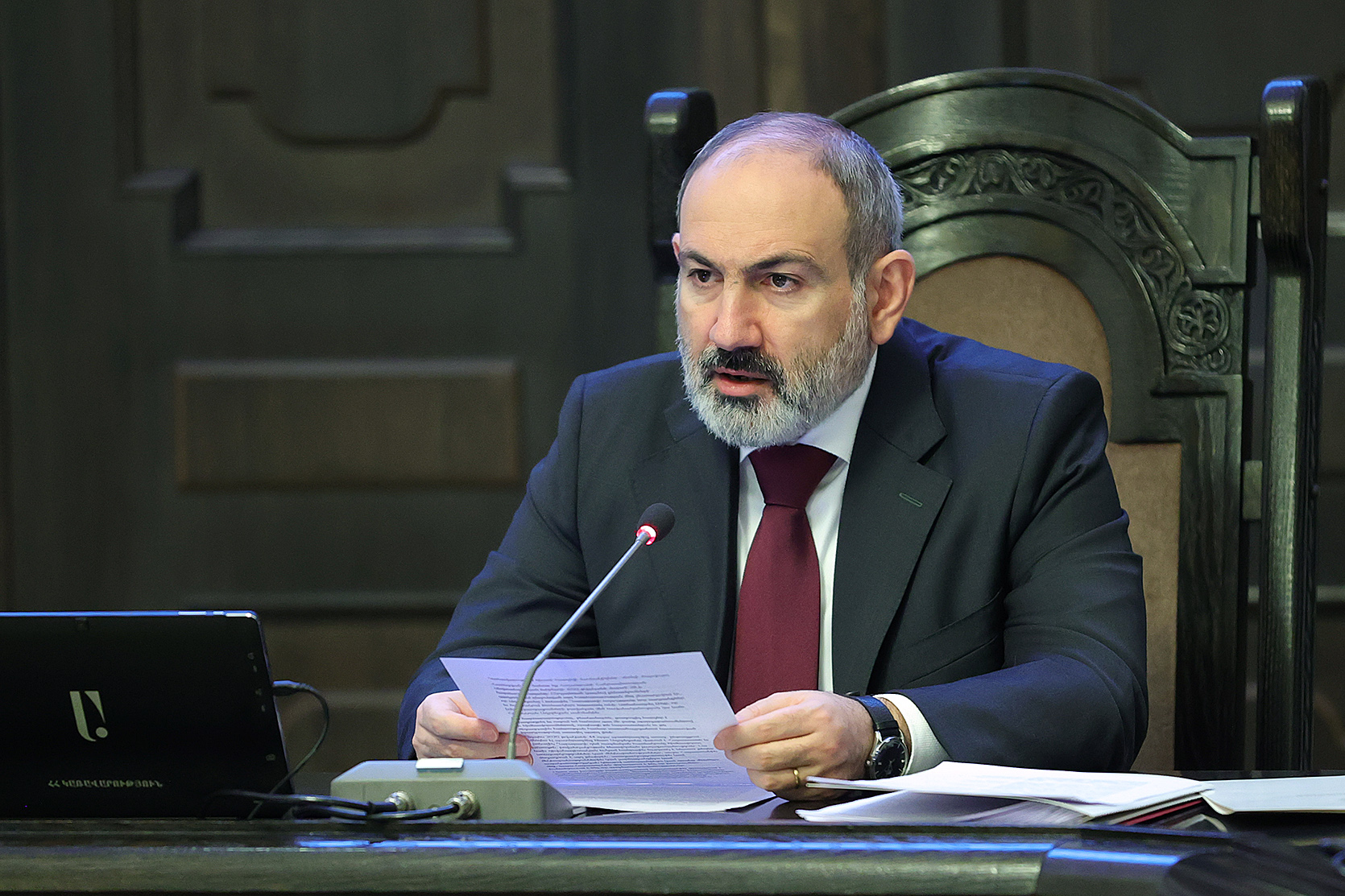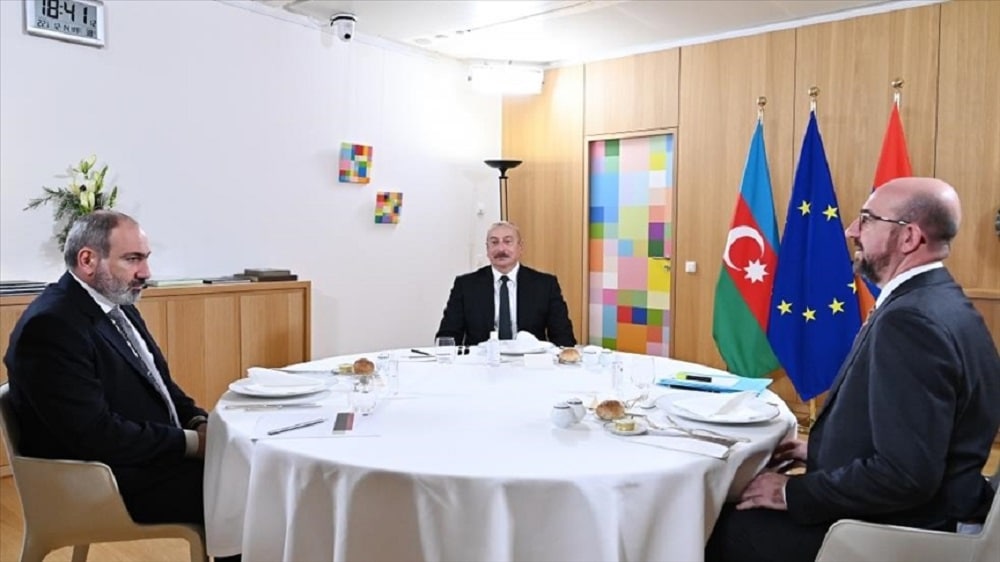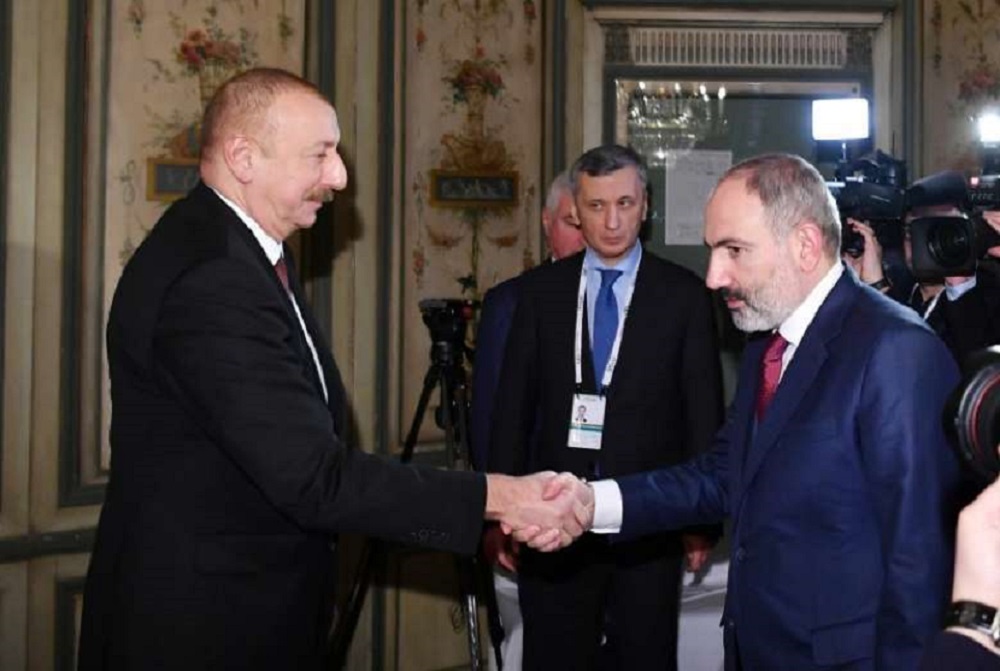Armenia-Azerbaijan meeting in Brussels: what Baku and Yerevan managed to achieve?
The second meeting of the leaders of Azerbaijan and Armenia in Brussels, mediated by the head of the European Council, became the most discussed topic in both South Caucasian countries. Both the authorities and political observers in Baku and Yerevan commented on the results of the summit.
- EU Ambassador to Georgia: We must take Ukrainian intelligence allegations of Russia’s smuggling seriously
- Abkhazia fails to pass law prohibiting privatization of energy
- ‘Give us the evidence’ – Georgian State Security Service on smuggling claims made by Ukraine
After a trilateral meeting that lasted more than four hours and ended well after midnight South Caucasian time, the head of the European Council, Charles Michel, issued a statement.
The document says that the leaders of the two countries took stock and assessed the situation after their last meeting in Brussels in December 2021 and their video conference with President Macron in February 2022.
The head of the European Council stressed the importance of humanitarian gestures on both sides for the purpose of confidence building and peaceful coexistence. He stressed the need for a complete and speedy solution of all outstanding humanitarian issues, including the release of the Armenian military remaining in Baku and a comprehensive solution to the problem of the missing. Charles Michel stated that the EU was ready to support these efforts.
“The EU will also continue to support confidence-building measures between Azerbaijan and Armenia, as well as humanitarian demining efforts, including through the provision of expert advice and increased financial assistance, as well as assistance to conflict-affected populations, rehabilitation and reconstruction”, the statement reads.
One of the main points of the statement was the part about the delimitation and demarcation of the borders between Armenia and Azerbaijan:
“The delimitation and demarcation of the border will be essential; to this end, in accordance with the Sochi Statement of November 26, 2021, it was also decided to convene the Joint Border Commission before the end of April. The mandate of the Joint Boundary Commission will be as follows:
- delimit the bilateral border between Armenia and Azerbaijan,
- ensure a stable security situation along and near the border.”
Information from Baku
“During the meeting, the principles on which Azerbaijan has always advocated in connection with the development of the region at the post-conflict stage, including the issues of full compliance with the provisions of the tripartite statement of November 10, 2020, the continuation of humanitarian steps to promote peace and trust between the parties, the adoption of concrete steps to delimit and demarcate the border of the two states, open transport communications”, the Azerbaijani Foreign Ministry said in a statement following the summit meeting in Brussels.
The Foreign Ministry noted that during the meeting, the importance of humanitarian measures was emphasized in terms of promoting peace and trust between the parties, including issues related to missing persons and the importance of clearing the territory from mines.
“The foreign ministers of both countries were instructed to start preparing a peace agreement between the two countries on the basis of the initiative put forward by Azerbaijan a year ago and the basic principles presented by our side some time ago.
…Thus, the Brussels meeting of the leaders of Azerbaijan and Armenia with the participation of the President of the EU Council is another important step taken in the interests of Azerbaijan and ensuring the further development of the region in conditions of peace and tranquility”, the Azerbaijani Foreign Ministry said.
Comments from Baku
“Will the Kremlin accept the active mediation of Brussels?”
According to Elkhan Shahinoglu, a political scientist and head of the Atlas analytical center, several results of the meeting in Brussels, which lasted more than 4 hours, can be noted:
“Firstly, the parties stressed the importance of addressing outstanding humanitarian issues. This includes the EU assistance in mine clearance, assistance to the population affected by the conflict, expert and financial assistance for rehabilitation and construction work. The Armenian side always raises the issue of “the return of Armenian prisoners.” In contrast, the Azerbaijani side raises the issue of the fate of thousands of Azerbaijanis who went missing in the first Karabakh war. Armenia prefers to pass over this issue in silence.
Secondly, the creation and holding of the first meeting by the end of April of a joint commission on the delimitation of the border between Armenia and Azerbaijan is envisaged. The Commission’s mandate will consist of a bilateral delimitation of the border, as well as ensuring a stable and secure situation along the border line.
Thirdly, the ministries of foreign affairs of the two countries have been entrusted with the preparation of a peace treaty, where all the necessary issues will be resolved.
Fourthly, the issue of restoring the communication infrastructure in the South Caucasus was discussed.
There is not a single proposal about the Minsk Group and Karabakh in the statement. This is in favor of Azerbaijan.
Azerbaijan is not interested in negotiations within the framework of the Minsk Group and does not want to involve international organizations in the discussion of the Karabakh issue after the war. This is an internal question.
Negotiating within the European Union is useful for Azerbaijan. Our country has very close ties with the EU and the countries that are members of the union. Amid the war in Ukraine, Europe’s need for Azerbaijani oil and natural gas has increased. Given Brussels’ interest in mediation, official Baku needs to speed up the process of signing an agreement on cooperation with the European Union.
Thus, the points designated in Brussels play into the hands of Azerbaijan. But this does not mean at all that the points agreed upon in the statement will be implemented immediately.
The need to start negotiations on the delimitation of the borders was noted in several documents in the post-war period. Despite this, Armenia is playing for time and is not facing any pressure on this matter. There is no progress on the issue of the corridor either.
In December 2021, in Brussels, an agreement was reached to restore railway communications. But so far, Yerevan has not taken a single step in this direction, while Azerbaijan signed a memorandum on the construction of a railway through Iran.
In the mediation initiatives of the EU, the factor of Russia cannot be ignored. At the time of the first meeting in Brussels, the war in Ukraine had not yet begun, and at that time the Kremlin could still tolerate the EU mediation. But with the beginning of military intervention in Ukraine and the imposition of tough sanctions on Russia by the EU countries, the Kremlin will try to interfere with Europe’s mediation activities between Azerbaijan and Armenia.
It is no coincidence that a rally against Nikol Pashinyan was held in Yerevan when he was in Brussels, the ceasefire regime was violated on the border in the direction of the Tovuz region. On the other hand, Sergei Lavrov summoned his Armenian counterpart Ararat Mirzoyan to Moscow on April 8. Moscow will probably require a detailed report on the meeting in Brussels”.
“A unique chance for sustainable peace has appeared”
“The meeting in Brussels was very important, such contacts are necessary for building peace. The foreign ministries of the two countries will create a commission that will work according to the five principles proposed by the Azerbaijani side, the negotiations will intensify.
In the final statement, there is a reference to the Sochi agreements, and this is done in order to reassure Moscow. It is clear that it is impossible to completely leave Moscow aside from these negotiations.
But the initiative is good, a truly real-politic one. But now everything depends on practical steps on the ground. Both countries should protect themselves from provocations, mainly coming from the North, should try to act in a coordinated manner. A unique chance for sustainable peace has appeared, this chance should not be missed”, wrote Natik Jafarli, an Azerbaijani politician and one of the leaders of the Republican Alternative opposition party.
Information from Yerevan
On the morning of April 7, immediately after returning from Brussels, the Prime Minister of Armenia presented some details of the negotiations.
He said that agreements had been reached on two issues. The first is an instruction to the foreign ministers of the two countries to start preparing a future peace treaty. He stressed that it is of fundamental importance for the Armenian side to include the issue of the rights and security guarantees of the people of Nagorno-Karabakh in the agenda of negotiations on a peace agreement, as well as to clarify the final status of NK.
Another addition from the Armenian side, according to Pashinyan, is the participation in this process of the OSCE Minsk Group co-chairs from the United States, France and Russia, through with the mediation of whom peace negotiations were held before the 2020 Karabakh war.
Speaking about the second agreement, the formation of a bilateral commission on the delimitation of the Armenian-Azerbaijani border, the prime minister said that a compromise was found during the negotiations:
“You know that there are territories of Armenia that are under the control of Azerbaijan, there are territories of Azerbaijan that are under the control of Armenia. These issues should be resolved by means of negotiations, on the basis of naturally de jure substantiated protocols and facts of legal significance. […]
Our position is that there is a border between Armenia and Azerbaijan, that is, the border that existed in Soviet times. With this protocol, work on demarcation should begin, and solutions should be sought by taking parallel measures to ensure security and stability”.
Pashinyan stated that there is an agreement to move forward in both directions.
The prime minister again emphasized that he and his team will continue to advance the agenda of “an era of peaceful development for the country and the region”:
“We must do everything we can to make this agenda a reality. I repeat, unfortunately, it does not only depend on us. But we must consistently do our part”.
As for the escalation in Nagorno-Karabakh, where the Azerbaijani armed forces took the territories controlled by the Russian peacekeeping contingent, according to the prime minister, the discussions “did not lead to a unified assessment of the situation”:
“And I did not consider it expedient to further discuss this issue at the Brussels meeting, because we are talking about the invasion of Azerbaijani units into the zone of responsibility of the Russian peacekeeping mission in Nagorno-Karabakh. This issue should be discussed more with the participation of Russian partners, what we are doing and will continue to do.
Accordingly, we expect Russian peacekeepers in Nagorno-Karabakh to take steps to ensure the withdrawal of Azerbaijani units from their zone of responsibility. We consider it necessary to conduct an investigation into the adequacy of the actions of Russian peacekeepers at the stage and possible inaction during these events”.
Commentary from Yerevan
“Armenian authorities retreated from their previously declared positions”
The head of the European Council, Charles Michel, the organizer and mediator of the second round of European negotiations between Pashinyan and Aliyev, assessed them as very successful and effective. Baku is also pleased with the results of the meeting. As for the interests of the Armenian side, according to political scientist Tigran Grigoryan, the Armenian authorities retreated from their previously declared positions on at least two issues:
“The first relates to the process of delimitation and demarcation. We remember that the Armenian authorities have been talking for months about the need to stabilize the situation on the border and take measures to ensure the security of the border in order to create an appropriate commission. There was a point about this in the tripartite statement of November 26, adopted in Sochi. The sequence was also stipulated there: first, these steps should be taken, then a commission on delimitation and demarcation should already be created. From Michel’s statement, we learned that the commission is being created without these preliminary steps.
It is said that the commission will also deal with security issues at the border, but I think that this item was introduced so that the Armenian authorities have the opportunity to save face (face saving).
The second step of retreat during this meeting is related to the agenda of the peace treaty. Over the past weeks, Armenia has regularly stated that peace talks should be held within the framework of the OSCE Minsk Group, with the mediation of the Minsk Group [a format for a peaceful settlement of the Karabakh conflict mediated by the co-chairs from the United States, France and Russia before the 2020 war – JAMnews].
In Michel’s statement, there is no mention of the Minsk Group, moreover, it seems that it is about bilateral negotiations, which corresponds to the position of Azerbaijan.
The third disturbing point in this statement is that this is not the first time that the EU statement does not contain any mention of the Nagorno-Karabakh conflict. This also corresponds to the approaches and positions of Baku. Therefore, it is no coincidence that the Ministry of Foreign Affairs of Azerbaijan positively assesses this meeting and the final statement.”
Meanwhile, in a message released after the talks by the Armenian side, it is said that the Prime Minister presented the situation in Nagorno-Karabakh during the talks. We are talking about the capture by the Azerbaijani Armed Forces of the territories under the responsibility of the peacekeeping contingent, and the refusal to return to their original positions. In this regard, the political scientist says that, of course, there was a conversation, and it would be surprising if it did not exist, the problem is that this issue is not included in the statement of the EU representative. And he considers this another omission of the Armenian side:
“This approach, ignoring the Karabakh conflict, is fully consistent with the approach of Baku. We know that the Azerbaijani authorities are even urging various international actors to avoid using the term “Nagorno-Karabakh” in their public speeches.”
As for the preparatory work on the peace agreement, Tigran Grigoryan considers it premature to discuss its content, since so far there is too little information:
“It will be possible to talk about this when the peace talks move into the stage of more substantive discussions, there will be relevant statements.
I don’t think that the Armenian delegation refused those additions that they submitted to Baku. [Azerbaijan, for its part, put forward 5 fundamental points of the peace agreement, the Armenian authorities replied that there is nothing unacceptable in them, but they do not reflect the entire agenda, and made their proposals, local experts believe that we are talking about the Karabakh issue, excluded from the Baku list — JAMnews].
In the text of Michel’s statement, we see that we are talking about a peace treaty that will include all possible issues. That is, we can assume that we are talking about issues related to the Karabakh conflict and Nagorno-Karabakh. The approaches of the parties in this matter remain opposite, and this will be the main obstacle to progress in this process.”
Speaking about the achievements achieved during the negotiations on the European platform during both rounds of negotiations, including the first meeting in Brussels last December, the political scientist, first of all, speaks of an agreement to restore railway communication. This was in the interests of the Armenian side, since there was no mention of “corridors” in Charles Michel’s statement. This was Baku’s approach to unblocking communications in the region, and the Armenian side was categorically against the loss of sovereignty over the roads.
“However, in the latest statement, it is also troubling that the recent military escalation by Azerbaijan has not received a proper assessment.
The wording was pretty neutral. For example, it was said that the parties must adhere to the November 9 agreements [the cessation of hostilities document that ended the 2020 war]. But it is clear that Baku and Yerevan interpret this wording differently.
Baku may say that this means the withdrawal of the Armenian armed forces from Nagorno-Karabakh, which they have been talking about all the last weeks. And the Armenian side can note that we are talking about violations of the ceasefire regime.
In a word, the Armenian side must ensure that such statements at least give a sober assessment of the ongoing processes.
After all, the European Union positions itself as a structure based on the principles of protecting values. And if the EU avoids talking about the ethnic cleansing policy pursued by Azerbaijan, then such an approach can be called quite cynical,” the political scientist said.
After the end of the Brussels talks, unofficial sources in Armenia began to say that Baku had completely closed the issue of returning Armenian prisoners to their homeland. And allegedly they will be able to return only after they have served the term in prison assigned to them by the Baku court. However, the political scientist does not consider such a scenario plausible:
“Baku is using the question of the prisoners as leverage. They will simply use this topic to seek new concessions from Armenia.
Baku has been pursuing just such a policy in recent months. We remember that earlier there were also statements about the prisoners that they were “criminals” and should serve their sentence, but as a result of reaching certain agreements, these people were released and returned to Armenia.”
The last question of JAMnews concerned the role of Russia in the region, whether there is a tendency to oust it from the Armenian-Azerbaijani negotiations and completely move to the European platform.
“I do not think that the Russian Federation will remain on the sidelines. It is clear that the EU is now using the fact that Russia is waging war in Ukraine and filling this vacuum.
That is why the range of issues that are resolved through the mediation of the European Union has expanded. However, after the end of the Russian-Ukrainian war, at some stage Russia is likely to become more active in our region and again try to take on an important mediating role.
In this sense, it will be interesting to see how these parallel formats will exist and which will be more effective,” Tigran Grigoryan replied.










